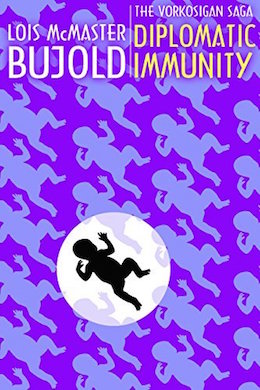In chapter 17 of Diplomatic Immunity, Miles is confined to the Idris’s infirmary, strapped down (seizure precautions!) and transported in the general direction of Cetagandan space.
I’ve been thinking a lot about Miles this week—as is my habit, now, two-and-a-half years in to this reread, but more than usual because Miles is on his honeymoon, and I’m working on planning my twentieth anniversary. If there is anything worse than a life in ruins with vomiting, it is surely a life finally gotten into perfect working order but with a high probability of imminent death and/or the termination of all sexual contact due to Weaponized Cetagandan Death Plague. I have twenty years of what Miles is could so easily miss: Eating cheese, folding laundry, and making bad jokes about the domestic architecture of New England. I’ve been very fortunate on the Weaponized Cetagandan Death Plague front.
Miles is on the Idris, with Roic to handle important health care issues like alerting the chief surgeon to Miles’s seizure disorder. If he spends time pondering this issue, it’s between helping Bel explain where the Ba left a virus bomb and being mostly delirious. (Miles, like his father before him, likes to keep busy with work when confined to hospital.) The loss we see Miles contemplating—other than his sex life, which is fair in the circumstances—is the loss of his covert ops career, which he is reminded of when Bel calls for “The Admiral.” Ekaterin is following in convoy on his personal courier. She brings a Vor-ish stiff upper lip. We don’t get much of her view, but I imagine the implications of Miles’s death are on her mind. She’s about to have two children, whether Miles lives or not. This is not her first whack at widowhood, but it would be a very different loss than Tien’s. Miles mentions wanting to give her something different, and at the time that he said it, he wasn’t thinking entirely of a large trust fund and some very supportive in-laws.
Miles emerges from his periodic delirium in Cetagandan space, an uncertain but probably short time later. He wrote incoherent letters to his family to be delivered in case of his death, and Ekaterin refuses to destroy them. She says the one to Ivan was particularly touching. I’m glad Ivan finally got his due, even if it’s not delivered for another seventeen years and I haven’t had a chance to read it. Family means a lot of different things, and Ivan has been all of them.
Bujold is emphasizing the theme of family this week as we look at the return of the Haut infants to their families on Rho Ceta. The nature of Cetagandan parenthood has been a topic of a lot of conversation in the comments over the last few weeks, and I have stayed mostly out of it. I wanted to refine my thinking. Bujold deals with a lot of visions of parenthood. Betans get licenses. Barrayarans can have biological accidents. Men on Athos earn credits and grow beards. Cetagandans appear to be the most hands-off. If you think that genetics play a much more significant role in individual destiny (for lack of a better term) than nurture, there’s really only so much to do. Those Cetagandans who the Star Creche has chosen to have children in any given year are being honored. They have proven their fitness—or, at least, their possession of interesting genes—to the review board, and their genes are then passed on. I think it’s likely that Cetagandan Haut babies usually get their genes from more than two otherwise-unrelated contributors—Miles’s genes are added to the Empire’s gene banks, and I can’t imagine the Star Creche calling him back in ten years to ask if he can meet his child and co-parent at a ceremony somewhere. I imagine that a group of engineers as adept as the Star Creche is accustomed to making insertions and modifications for specific purposes. And when two Cetagandans have a child, it’s the subject of a great many very complicated arrangements.
Miles notes that parent and child may never see each other again once the replicators are handed over to the planetary creche to be opened and children raised. That sounds like a bad scene—it didn’t go so well for the Quaddies in Falling Free who had no adult community to superintend their interests or safety. It didn’t go well for Mark, and it went even less well for his fellow clones on Jackson’s Whole. In the Galactic Nexus, having parents has typically meant having protection. But it doesn’t have to be that way. We’ve never seen an adult Cetagandan reminisce about their childhood creche. We have seen many, highly-educated and very competent Haut (mostly women—Miles hasn’t spent much time with the Haut men). This implies that creche conditions are good. And we know that the Star Creche tests genes carefully—the renegade Ba in this story was a clone of the Cetagandan Emperor.
Buy the Book


Static Ruin
Even the most ardent proponents of the belief that genes trump environment will concede that environmental factors can interfere with efforts to optimize genetics. The Cetagandans are looking for the best possible results from their Haut genetic experiments, and they appear to have decided that parental care is not the most reliable route to the best possible outcome. I disagree. But my feelings don’t matter in this case—I’m not Cetagandan and I don’t get to decide what best practices are for raising Haut children to be generals, emperors, and genetic engineers in the Cetagandan Empire. While contributing to the genes of the next generation of Cetagandan Haut is an individual honor, raising children appears to be a collective responsibility managed by institutions. That’s very alien to me. Kind of like Cetagandans.
It’s clear from the ritual Miles witnesses that none of that diminishes the importance of children in Cetagandan culture. After an important moment of mourning for the Haut lady who went down with the ship, the uterine replicators are greeted with joy and enthusiasm. I don’t know if Haut parents choose between privately-owned creches, or all send their children to one, publicly-run one. It’s possible that each clan has a creche of their own. The results suggest that a great many resources are invested in them.
For comparison, Bujold finishes up with Miles and Ekaterin’s childrens’ births. Aral Alexander and Helen Natalia are decanted in the presence of their Vorkosigan grandparents, their older brother Nikki, and their uncle (Ekaterin’s brother, who maybe gets a little over-excited about holding the vid recorder). Cordelia fists her hands in her skirts to keep from grabbing a baby. We will, of course, be dealing with that later.
Next week—Captain Vorpatril’s Alliance!
Ellen Cheeseman-Meyer teaches history and reads a lot.










